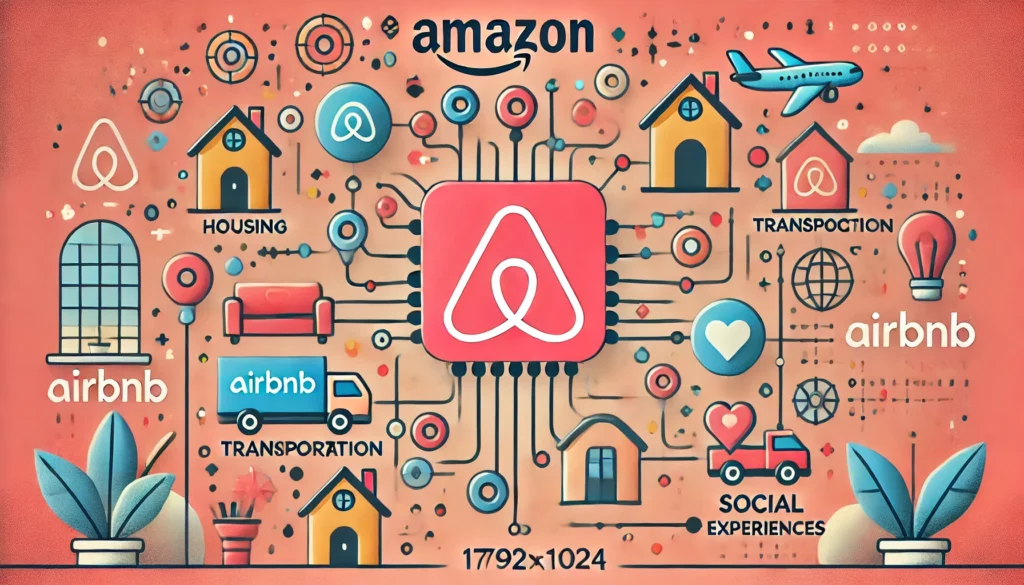For several years, Airbnb has been stepping beyond short-term rentals and traditional accommodations with initiatives like Airbnb-Friendly Apartments and Experiences. The company has also hinted at future possibilities, such as an AI-driven “Airbnb Concierge” that could transform it into a lifestyle brand. Now, for the first time, Brian Chesky, Airbnb’s CEO, is officially detailing the Amazon-like strategy behind this evolution.
In a bold pivot reminiscent of Amazon’s journey from bookseller to “everything store,” Airbnb is preparing to expand into a comprehensive lifestyle platform, with plans to launch up to two new businesses per year, starting with adjacent verticals and scaling rapidly across 100 cities at a time. “We have a huge opportunity to expand beyond our core business of accommodations,” Chesky said, drawing a parallel to Amazon’s growth trajectory.
Chesky envisions a “branded house” where services like housing, experiences, transportation, and even local community engagement come together in a unified, global app. From car rentals to roommate matching, Airbnb has teased a range of potential new services, all grounded in three essential platform capabilities: marketplaces, an international payment infrastructure, and a trust system that can adapt to various offerings. Here’s a look at how Airbnb is positioning itself for this major transformation.
The Amazon-Inspired Vision of Becoming a Platform
Brian Chesky is clear about Airbnb’s long-term vision. “For the last 17 years, we’ve only sold one thing, which is basically vacation rentals…we’re ready to expand beyond our core business,” he says. Inspired by Amazon’s journey, Airbnb is aiming to go from a single-vertical service to a platform capable of serving diverse user needs.
Unlike some competitors, such as Uber, which launched Uber Eats gradually on a city-by-city basis, Airbnb intends to deploy its new offerings across more than 100 cities simultaneously. Chesky emphasizes the ambition to scale quickly, citing lessons learned from other marketplace giants: “When we launch some new offerings next year, they’re going to be available immediately in more than 100 cities around the world.” This aggressive rollout strategy reflects Airbnb’s maturity and readiness to introduce users to a cohesive suite of services under one brand.
The Essentials of a Successful Marketplace
For any marketplace to succeed, three core elements are essential: (1) gathering supply and creating demand, (2) a seamless payment system, and (3) a reliable trust system. Airbnb has built and refined all three, setting it apart from competitors still struggling in these areas—for example, Booking.com continues to face challenges with its payment and payout systems.
- Supply and Demand: Airbnb’s platform effectively connects hosts and travelers, creating a robust cycle of new supply and demand that keeps the marketplace vibrant.
- Integrated Payment System: Airbnb’s payment infrastructure handles complex, cross-border transactions smoothly, providing ease and reliability for both guests and hosts.
- Trust and Quality: Airbnb’s reciprocal reviews, fraud detection, and quality controls establish a safe environment, ensuring positive interactions and high standards across the platform.
With these pillars in place, Airbnb has a solid foundation to expand into new services, able to leverage its established marketplace, payment, and trust systems across future verticals.
Building Airbnb’s Core Platform Capabilities for Expansion
Marketplace Infrastructure
From short-term rentals to mid-term stays and experiences, Airbnb has developed robust marketplace expertise, building connections between supply and demand across various verticals. This foundation prepares Airbnb for an even broader marketplace expansion:
- Short-Term Rentals: Airbnb’s core business and the origin of its marketplace model.
- Mid-Term Rentals: Targeting digital nomads and remote workers, mid-term rentals provide a flexible option for longer stays.
- Airbnb-Friendly Apartments: By working with landlords, Airbnb allows tenants to sublet their apartments, creating a hybrid space between short-term and long-term rentals.
- Experiences: Initially travel-focused, Airbnb plans to extend its Experiences marketplace to local communities, providing daily activities that could transform Airbnb from an annual-use app into a weekly or even daily-use platform.
Looking ahead, Chesky has hinted at other potential services, such as car rentals.
Car Rentals and Shared Mobility:
- Chesky has hinted at expanding Airbnb’s services to include car rentals, among other potential offerings.
- In an October 2023 interview with the Financial Times, he mentioned a “long list of ideas,” with car rentals and pop-up dining experiences as examples.
- “The second biggest asset usually in someone’s life after their home is their car,” Chesky said, implying that a car-sharing marketplace could be a natural addition to Airbnb’s platform.
- This potential car-sharing service would offer both travelers and locals easy access to transportation, integrating car rentals as seamlessly as booking a stay on Airbnb.
Roommate Matching and Community Living:
- Airbnb’s expansion into housing, particularly through Airbnb-Friendly Apartments, hints at new possibilities like roommate matching.
- Given Airbnb’s focus on reducing loneliness, a logical next step could be to combine Airbnb Rooms with Airbnb-Friendly Apartments to introduce a “Roommates” feature.
- This service would enable users not only to find the right place to live but also to match with compatible roommates, leveraging Airbnb’s advanced algorithms and trust systems to foster safe, community-oriented living spaces.
International Payment Solutions
One of the critical pillars of Airbnb’s platform strategy is its international payment infrastructure, designed to accommodate users worldwide. By Spring 2025, Airbnb aims to support nearly 40 local payment methods globally. This extensive array of options allows users to transact effortlessly in their preferred currencies and methods, removing friction in the booking process and enhancing accessibility for both guests and hosts.
- Global Coverage for Seamless Transactions:
- Airbnb’s payment solution supports transactions across diverse regions, from booking a vacation rental in Tokyo to splitting the cost of an experience with friends in Paris.
- This flexibility makes Airbnb adaptable to various local markets, fostering a user-friendly experience regardless of geographical location.
- Support for Multiple Use Cases Across Services:
- As Airbnb expands its service offerings, the payment infrastructure will facilitate new ways to transact:
- Car Sharing: Users could easily book and pay for car rentals through Airbnb, sharing costs with friends or family via a secure, integrated platform.
- Roommate Matching: Potential co-tenants could split deposits, rent, and shared expenses within Airbnb’s payment ecosystem, streamlining financial management for shared living arrangements.
- As Airbnb expands its service offerings, the payment infrastructure will facilitate new ways to transact:
- User-Friendly Cost Splitting:
- Airbnb’s system could incorporate cost-splitting options for group bookings, allowing users to divide expenses for stays, activities, and rentals directly within the app.
- This feature would replace or reduce the need for third-party apps like PayPal and Splitwise, making group travel and shared housing more convenient and hassle-free.
This scalable, integrated payment system not only enhances user convenience but also strengthens Airbnb’s position as a versatile lifestyle platform, providing the financial tools needed to support diverse services and simplify transactions across different markets.
Trust Systems for Safety and Quality Assurance
Airbnb’s trust system is fundamental to its reputation and reliability, built on essential features like reciprocal reviews, fraud detection, and rigorous quality control. In 2024 alone, Airbnb demonstrated its commitment to quality by removing over 300,000 low-performing listings. This proactive approach to trust and safety establishes a strong foundation as Airbnb diversifies its offerings.
- Maintaining High Standards Across Services:
- Airbnb’s review system and fraud detection tools create a safe environment by fostering transparency and accountability among users, which is critical as it expands into new service areas.
- For new offerings, these trust mechanisms can be tailored to ensure a reliable experience, whether someone is booking a room, renting a car, or finding a roommate.
- Enhanced Safety for New Vertical Integrations:
- Car Sharing: Safety is paramount in peer-to-peer car rentals. Airbnb’s existing trust system can be adapted to include background checks, insurance verification, and vehicle condition assessments, helping renters feel secure when booking a car through the platform.
- Roommate Matching: For shared living arrangements, Airbnb could implement identity verification, compatibility matching, and background checks. These measures would allow users to connect confidently with potential roommates, creating a secure environment for co-living.
- Building Community and Connection:
- Airbnb’s trust systems not only ensure safety but also support community building by fostering positive interactions and reliable connections.
- With trust at its core, Airbnb can expand into social services like roommate matching and local experiences, reinforcing its commitment to meaningful, safe, and trustworthy relationships within its platform.
Airbnb’s adaptable trust infrastructure provides a dependable foundation for expanding into new services, ensuring that the platform remains safe, community-oriented, and reliable across every user interaction. This trusted environment is integral to Airbnb’s goal of becoming a comprehensive lifestyle platform, seamlessly supporting diverse user needs.
The Role of Airbnb Concierge as the Platform’s AI Hub
As part of its vision, Airbnb is developing “Airbnb Concierge,” a lifestyle super-app powered by advanced AI. Chesky has described Airbnb’s goal of becoming the ultimate “travel agent,” combining personalization, recommendations, and on-demand services.
“Imagine it’s 2025,” Chesky has said, “and Airbnb Concierge is a lifestyle super-app…making the whole world feel like home.” With the acquisition of Gameplanner AI, Airbnb is poised to integrate deep personalization into every aspect of its services, from travel planning to roommate matching. This AI-driven assistant would serve as the central hub connecting users to all of Airbnb’s offerings:
- Lifestyle Planning: Personalized suggestions for housing, experiences, and even car rentals based on user history and preferences.
- Community and Social Connectivity: Tools to help users connect with roommates, join local events, and build community wherever they are.
- Financial and Transactional Support: Integration of payment, split payments for roommates, and seamless expense management for group bookings.
With Airbnb Concierge, users could have a single app for all aspects of travel and daily life, from finding an apartment and a compatible roommate to booking local experiences and transportation. This would not only simplify users’ lives but also position Airbnb as a true lifestyle platform.
Amazon-like low dividends to fuel this expansion?
Airbnb’s ambitious move to become a lifestyle platform goes far beyond just vacation rentals. Inspired by Amazon’s growth, CEO Brian Chesky is driving the company to add new services that meet a wider range of needs—housing, experiences, transportation, and more—backed by its strong marketplace, payment, and trust systems. However, this expansion will require significant investment, and it could impact profit margins in the short term. Investors may grow impatient if these new ventures take time to pay off, but if successful, Airbnb has the potential to become a key part of daily life, changing how we travel, connect, and live.








